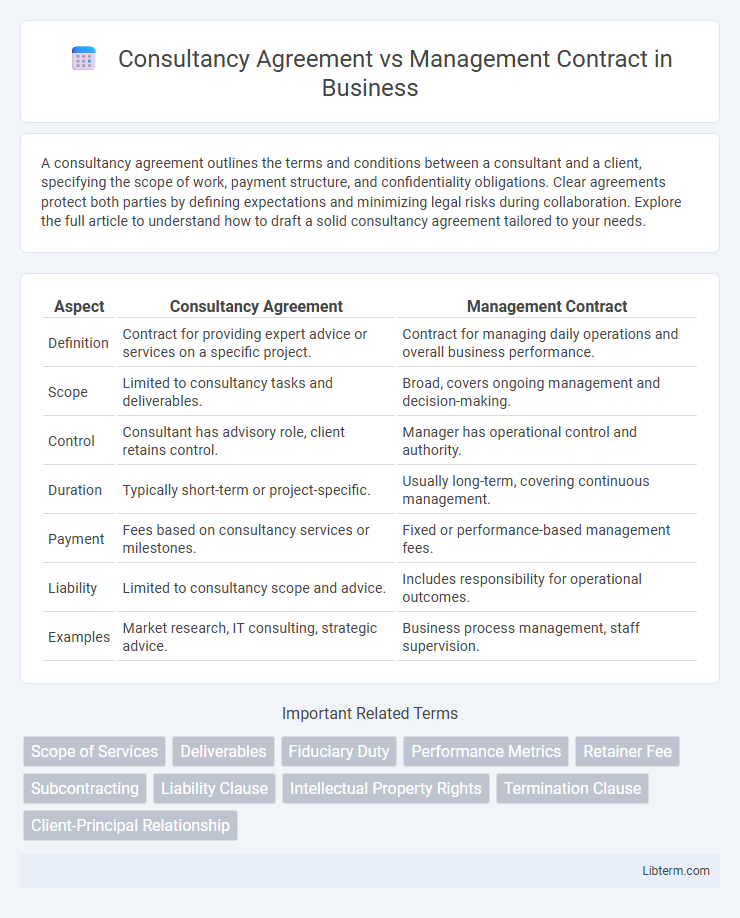A consultancy agreement outlines the terms and conditions between a consultant and a client, specifying the scope of work, payment structure, and confidentiality obligations. Clear agreements protect both parties by defining expectations and minimizing legal risks during collaboration. Explore the full article to understand how to draft a solid consultancy agreement tailored to your needs.
Table of Comparison
| Aspect | Consultancy Agreement | Management Contract |
|---|---|---|
| Definition | Contract for providing expert advice or services on a specific project. | Contract for managing daily operations and overall business performance. |
| Scope | Limited to consultancy tasks and deliverables. | Broad, covers ongoing management and decision-making. |
| Control | Consultant has advisory role, client retains control. | Manager has operational control and authority. |
| Duration | Typically short-term or project-specific. | Usually long-term, covering continuous management. |
| Payment | Fees based on consultancy services or milestones. | Fixed or performance-based management fees. |
| Liability | Limited to consultancy scope and advice. | Includes responsibility for operational outcomes. |
| Examples | Market research, IT consulting, strategic advice. | Business process management, staff supervision. |
Understanding Consultancy Agreements
Consultancy agreements define the scope, deliverables, and fees for expert advice provided by consultants, emphasizing flexibility and specific project objectives. These agreements outline confidentiality, intellectual property rights, and payment terms tailored to consultancy services, distinguishing them from management contracts that involve ongoing operational control and decision-making authority. Clear understanding of consultancy agreements ensures precise role definition, minimizes legal risks, and aligns expectations between consultants and clients.
Defining Management Contracts
Management contracts specifically appoint an external party to handle operational control and day-to-day business activities of a company, contrasting with consultancy agreements which primarily provide expert advice without direct operational involvement. These contracts outline the scope of managerial duties, duration, remuneration, and performance metrics to ensure clear governance and accountability. Management contracts are prevalent in industries like hospitality and real estate, where specialized expertise is required to optimize business performance.
Key Differences Between Consultancy Agreements and Management Contracts
Consultancy agreements typically define the scope of advisory services, focusing on expert advice and strategic guidance without involving direct operational control, whereas management contracts delegate authority to manage day-to-day operations and decision-making responsibilities. Consultancy agreements usually have a fixed term and specified deliverables, while management contracts often entail ongoing responsibilities with performance-based metrics and may include staffing, budgeting, and operational oversight. The legal implications differ as consultancy agreements limit liability to consultancy services provided, whereas management contracts hold the manager accountable for operational outcomes and compliance.
Scope of Services: Consultancy vs Management
Consultancy agreements typically define a specific scope of services focused on advisory roles, providing expert recommendations, analysis, and strategic guidance without direct involvement in daily operations. Management contracts encompass a broader scope of services, including hands-on oversight, running business activities, decision-making authority, and implementation of policies on behalf of the client. The key distinction lies in consultancy delivering targeted expertise while management contracts imply comprehensive operational control and responsibility.
Legal Obligations and Responsibilities
Consultancy agreements define specific deliverables and advisory roles, imposing limited liability and typically excluding employee benefits, whereas management contracts establish comprehensive control over operations with broader fiduciary duties and direct managerial responsibilities. Legal obligations under consultancy agreements mainly involve confidentiality, compliance with contractual terms, and intellectual property rights, while management contracts demand adherence to corporate governance, regulatory compliance, and often include indemnification clauses. Distinguishing the two requires careful analysis of the scope of authority, control levels, and statutory employment regulations affecting liability and accountability.
Duration and Termination Clauses
Consultancy agreements typically have fixed durations with clearly defined start and end dates, allowing for termination upon expiry or mutual consent, while management contracts often feature longer or indefinite terms with specific performance milestones and termination based on breach or notice periods. Duration clauses in consultancy agreements emphasize project timelines, whereas management contracts focus on sustained service delivery over time. Termination clauses in consultancy agreements generally provide for immediate termination due to non-performance, whereas management contracts include detailed conditions for termination, such as cause, convenience, or regulatory requirements.
Payment Structures and Fee Arrangements
Consultancy agreements typically involve fixed fees or hourly rates based on the scope of advisory services, with payments often structured as milestones or periodic invoices aligned with project deliverables. Management contracts usually feature recurring fees or profit-sharing arrangements tied to ongoing operational oversight, incentivizing performance and long-term value creation. Understanding the distinctions in payment structures and fee arrangements helps businesses select the optimal contract type for controlling costs and aligning incentives with service objectives.
Risk Allocation and Liability
Consultancy agreements typically allocate risk by limiting the consultant's liability to the fees paid, focusing on advice and recommendations without direct operational control. Management contracts involve higher risk exposure as the manager assumes responsibility for day-to-day operations, making them liable for performance outcomes and operational failures. Clear definitions of indemnity, limitation of liability, and insurance requirements are critical to managing risks and liabilities in both types of contracts.
Choosing the Right Agreement for Your Business
Choosing the right agreement between a Consultancy Agreement and a Management Contract depends on the scope and duration of services needed for your business. Consultancy Agreements typically focus on providing expert advice and specific projects with defined deliverables, making them ideal for short-term or specialized tasks. Management Contracts involve ongoing operational responsibilities and decision-making authority, suitable for businesses seeking comprehensive management services and long-term partnerships.
Common Mistakes to Avoid in Drafting Agreements
Confusing the scope of services between consultancy agreements and management contracts often leads to unclear obligations and legal disputes. Failing to define performance metrics, deliverables, and termination clauses precisely results in ambiguity and potential conflicts. Overlooking intellectual property rights and confidentiality protections can expose both parties to data breaches and ownership issues.
Consultancy Agreement Infographic

 libterm.com
libterm.com